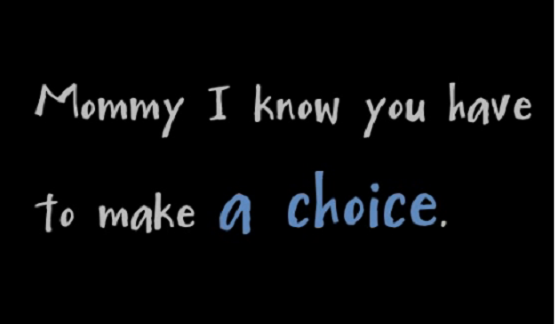Robert Fulghum is best known for his humongous best seller, “All I Really Need to Know I Learned in Kindergarten: Uncommon Thoughts on Common Things.” I still re-read it every so often, along with Richard Carlson’s “Don’t Sweat the Small Stuff–and it’s all small stuff.”
But when I read Kathy Ostrowski’s wonderful “If They had a Voice: Down Syndrome and medically challenging prenatal diagnoses,” my first thought was of another Fulghum book written in 1999—“Words I wish I wrote: A Collection of Writing That Inspired My Ideas.” Here’s why.
 Jack Barr’s video is a confessional—of how badly he had behaved when he learned that his daughter had Down syndrome. With Jason Mraz‘s wonderfully appropriate song, “I won’t give up,” functioning as the musical score, this poignant video takes the form of questions from (and pleas by) a 16-week old unborn child who has been diagnosed with Down syndrome, to his mother. “I can offer the world beautiful things,” she assures her.
Jack Barr’s video is a confessional—of how badly he had behaved when he learned that his daughter had Down syndrome. With Jason Mraz‘s wonderfully appropriate song, “I won’t give up,” functioning as the musical score, this poignant video takes the form of questions from (and pleas by) a 16-week old unborn child who has been diagnosed with Down syndrome, to his mother. “I can offer the world beautiful things,” she assures her.
Here’s what Fulghum wrote that is so helpful in grasping Barr’s total attitudinal transformation. (Fulghum is looking back at a personal credo he was asked to write while in graduate school):
“Now, in my sixtieth year, I’m curious about what lasts and what changes in this evolving credo. My reconsideration is well described in the words of playwright Lillian Hellman, in the introduction to her biographical reflection entitled ‘Pentimento.’” [She wrote].
“Old paint on canvas, as it ages, sometimes becomes transparent. When that happens it is possible, in some pictures, to see the original lines: a tree will show through a woman’s dress, a child makes way for a dog, a large boat is no longer on an open sea. That is called pentimento because the painter ‘repented,’ changed his mind. Perhaps it would be as well to say that the old conception, replaced by a later choice, is a way of seeing and then seeing again.”
It’d be hard to imagine a more complete “seeing and seeing again” of having “repented” than Barr’s commentary that accompanies the video and the aching poignant nature of the questions from the baby.
Here’s what Barr wrote:
“When my 2-year-old daughter was born, I told my wife I did not want her. I spent an entire year depressed because I believed everything society told me about having a daughter with Down syndrome. Now two years later she is the joy of my life. She is not a monster, she is not ugly, she is not retarded, and she is not a burden on our family. She is a beautiful little girl that brings joy to our daily lives. I understand the fear of having a child that is different, so I want to encourage you to consider taking the road less traveled and see the beautiful things a child with Down syndrome can show you.
Alert: when you watch the 4 minute, 3 second long video, you will cry like a baby. I know I sure did. But they are useful tears, they are human tears, they are the kind of tears that might help to wash away any residue of prejudice against babies who dare to be imperfect.
Why is “If They Had a Voice” so transformational? Because the unborn baby (“speaking” through Mr. Barr) asks the kinds of questions that expose what Barr obviously feels were his own dismissive and angry attitudes.
The baby is so understanding. She tries to soothe her mom who has had a very difficult day. Her mom has first learned the diagnosis—that her baby had Down syndrome–and later “daddy” lashed out saying, “I don’t want a retarded baby.”
The baby says she thought her mom would be happy that she had something ‘extra’—the extra chromosome that is associated with Down syndrome. Instead, her parents have fought and the baby asks (although they’ve only been “together” 16 weeks), “Have I ruined your life already?”
And then the part that just about slew me. She says, “Mommy, I just want to be with you. Maybe the doctor can change me? So you can keep me.”
Click here to sign up for daily pro-life news alerts from LifeNews.com
Unspoken but implicit is that the need for change was not a change in the baby’s condition, but a change in Mr. Barr’s stony heart.
The baby has heard the word “burden” and she asks what a “burden” is. “Does that mean you don’t want me anymore?”
She lists what the doctor says she might have, “but he forgot to tell you about the good things”: hugs and kisses and high-fives and compassion and most of all love.
The remainder of this beautiful video is a gentle prod to confront the ugly stereotypes, the put-downs that color people’s attitudes towards children who are “different” (Barr is obviously talking about—and to–himself).
If you aren’t blubbering by this point, the end will get you. “If you choose to end my life….” well, go to www.youtube.com/watch?v=rpmLc8s4OWM.
The final comments on the screen are a wonderful tribute from Barr to his wife. “Dedicated to my wife who gave me strength when I didn’t want the daughter, who opened my eyes to unconditional love.”
LifeNews.com Note: Dave Andrusko is the editor of National Right to Life News and an author and editor of several books on abortion topics. This post originally appeared at National Right to Life News Today.







